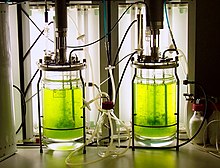
A photobioreactor (PBR) refers to any cultivation system designed for growing photoautotrophic organisms using artificial light sources or solar light to facilitate photosynthesis. Photobioreactors are typically used to cultivate microalgae, cyanobacteria, and some mosses.[1] Photobioreactors can be open systems, such as raceway ponds, which rely upon natural sources of light and carbon dioxide. Closed photobioreactors are flexible systems that can be controlled to the physiological requirements of the cultured organism, resulting in optimal growth rates and purity levels. Photobioreactors are typically used for the cultivation of bioactive compounds for biofuels, pharmaceuticals, and other industrial uses.[2]
- ^ Yuvraj; Ambarish Sharan Vidyarthi; Jeeoot Singh (2016). "Enhancement of Chlorella vulgaris cell density: Shake flask and bench-top photobioreactor studies to identify and control limiting factors". Korean Journal of Chemical Engineering. 33 (8): 2396–2405. doi:10.1007/s11814-016-0087-5. S2CID 99110136.
- ^ Benner, Philipp; Meier, Lisa; Pfeffer, Annika; Krüger, Konstantin; Oropeza Vargas, José Enrique; Weuster-Botz, Dirk (May 2022). "Lab-scale photobioreactor systems: principles, applications, and scalability". Bioprocess and Biosystems Engineering. 45 (5): 791–813. doi:10.1007/s00449-022-02711-1. ISSN 1615-7591. PMC 9033726. PMID 35303143.